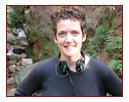|
Amy Costello has been reporting from around the African continent for the past five years. During that time she has covered issues ranging from food crises in Ethiopia, to child labor in Ivory Coast, to sexual abuse by UN peacekeepers in Sierra Leone. She has also reported on the ongoing conflict in Darfur, Sudan for the public television program Frontline/World. Amy is currently Africa Correspondent for the public radio program The World. She lives in Cape Town. POV: In your work, you consider the notion of "borders." What is a border to you? Amy Costello: As I've traveled through Africa, I've realized that borders are not always geographic locations on a map. After all, much of the continent's borders were drawn up haphazardly by former colonial powers, giving no consideration for tribal or ethnic allegiances. This is part of the reason why Africa has been fraught with civil war and cross-border conflicts. Disparate groups have been confined within artificial borders. As a result, many Africans have found that their ethnic, tribal or religious brethren are actually located in neighboring states. Ironically, many perceive their so-called "countrymen" as foreigners or even worse, as enemies. POV: What borders did you encounter while working on your pieces? Costello: I was concerned that being an American would make it more difficult for me to get candid responses from those I interviewed. However, I felt most people were unafraid to share their opinions about Americans with me. I discovered that most people are able to differentiate between their feelings towards American people and their feelings about U.S. foreign policy. So even if their opinions about the United States government were negative, I did not feel they were hostile towards me personally. As a result, they felt free to open up and share their views, however critical. POV: What is possible when innovative approaches to narrative and interactivity are combined? How is your piece different from traditional storytelling? Costello: I often find that people are more honest, and frankly, more interesting, when an interview is not pre-arranged. As journalists, we often have a tendency to choose professionals behind desks to give us insights into the issues we're reporting on. However, I think it's vitally important to balance these interviews by talking to ordinary people on the street who are directly impacted by the issues we're reporting on. By going with just one camera person, we could move freely down streets, around college campuses, or down the alleyways of townships and interview people "on the fly". This informal manner of filming tends to make subjects more comfortable because they're not so intimidated by big lights and microphones and large crews surrounding them. Whenever I'm traveling in Africa, I often stop on the side of the road in small villages and just begin knocking on doors to find out how people who live at the end of dirt roads are being impacted by the issues I'm reporting on. Often, this is where I find my most powerful and memorable voices. POV: How is your piece different from traditional storytelling? Costello: This piece is different from traditional story telling because it lacks a narrator's voice. The people we interviewed are left to speak for themselves. I think this style of story telling elevates the person-on-the-street interview because it allows the words of individuals to stand on their own without a narrator/journalist intruding with his or her own perspective and analysis. Sometimes I think journalists need to do a lot less talking and a lot more listening. This format encourages that. POV: What was exciting or challenging about those differences? Costello: As a journalist, I've grown accustomed to narrating my stories and offering analysis or perspective on the subjects I cover. With this assignment, it was challenging to just let the interviews stand on their own and to trust that they present a balanced view of popular opinion. I think web-based journalism is a great place for this approach. In some ways this kind of story telling cuts out the middle man (in this case, the journalist) and enables people in South Africa to speak directly to POV's web viewers, unfiltered and unedited. That's exciting. POV: Expand our borders. What's a book, movie, piece of music, website, etc., that challenges or engages with the idea of "borders" that we should know about but perhaps don't? Costello: There's a South African jazz singer named Simphiwe Dana. She sings in Xhosa. I don't understand any of the lyrics in her songs but it doesn't seem to matter. As soon as Dana begins to sing, the linguistic borders come crashing down and her voice alone is mesmerizing. POV: What are you working on next? Where can we see more of your work? Costello: I'm currently working on stories locally here in South Africa. I've recently reported on South Africa's high rates of Fetal Alcohol Syndrome for the public radio program The World and I wrote about South Africa's Oscar-winning film Tsotsi for the website of the public television program Frontline/World. A story I did about a water pump that's powered by the energy of children is scheduled for Frontline/World's May 9th television broadcast. You can hear my radio work from around Africa at The World and you can see my television story about the conflict in Darfur, Sudan at Frontline/World. |
